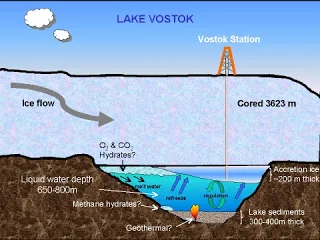Russian researchers do not exclude possible existence of living organisms at the bottom or in the waters of Lake Vostok, the biggest subglacial lake in Antarctica, but water samples they have are not pure enough to be sure of that.
"We cannot work with this water as it is polluted by bore hole liquid. We need a new technique of water samples collection. We think that is life does exist it can be found either in or at the bottom of the lake," Sergei Bulat, the head of cryoastrobiology laboratory of the Petersburg Institute of Nuclear Physics, said on Tuesday.
According to Bulat, special water samplers should be used to avoid pollution by bore hole liquid as it was in the first three samples. "If drillmen reach the lake for the fourth time, and they have promised to do that, and use our sampler, I hope we will finally have pure water," he said.
It is planned to use a filler of 40 meters of silicone to prevent water’s contact with kerosene or other bore hole liquids.
However, he lamented that this year’s funding of the Russian Antarctic expedition has been cut threefold.
Lake Vostok, measuring 250 by 50 kilometers, was discovered by the 33rd Russian Antarctic Expedition in 1987. It lies beneath some four kilometers of ice. Drilling was launched in 1989. In February 2012, researchers reached the watershed and took the first samples of water, which were found to contain traces of living organisms, yet unknown cold-resistant bacteria. However there was no 100% guarantee that these bacteria had originated from the subglacial lake, since water samples were polluted with priming water from the well. Months later however the water in the lake rose and froze at the level of 363 meters.
The explorers had to drill a new well parallel to the old one from the depth of 3,406 meters.
[tass.com]
4/10/16
-
Related:
"We cannot work with this water as it is polluted by bore hole liquid. We need a new technique of water samples collection. We think that is life does exist it can be found either in or at the bottom of the lake," Sergei Bulat, the head of cryoastrobiology laboratory of the Petersburg Institute of Nuclear Physics, said on Tuesday.
According to Bulat, special water samplers should be used to avoid pollution by bore hole liquid as it was in the first three samples. "If drillmen reach the lake for the fourth time, and they have promised to do that, and use our sampler, I hope we will finally have pure water," he said.
It is planned to use a filler of 40 meters of silicone to prevent water’s contact with kerosene or other bore hole liquids.
However, he lamented that this year’s funding of the Russian Antarctic expedition has been cut threefold.
Lake Vostok, measuring 250 by 50 kilometers, was discovered by the 33rd Russian Antarctic Expedition in 1987. It lies beneath some four kilometers of ice. Drilling was launched in 1989. In February 2012, researchers reached the watershed and took the first samples of water, which were found to contain traces of living organisms, yet unknown cold-resistant bacteria. However there was no 100% guarantee that these bacteria had originated from the subglacial lake, since water samples were polluted with priming water from the well. Months later however the water in the lake rose and froze at the level of 363 meters.
The explorers had to drill a new well parallel to the old one from the depth of 3,406 meters.
[tass.com]
4/10/16
-
Related:


No comments:
Post a Comment
Only News